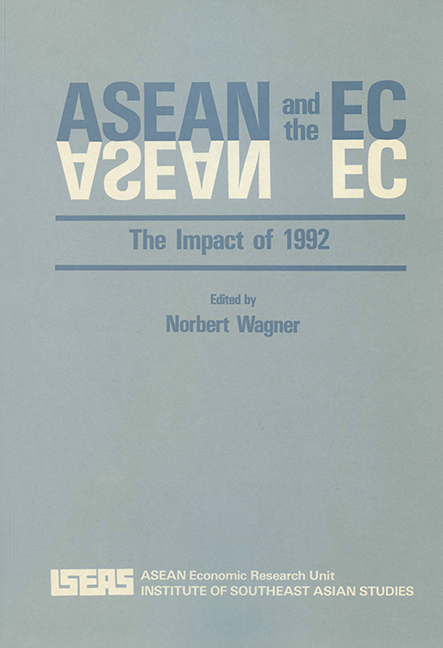I - The EC Internal Market and ASEAN: An Overview
from PART I - INTRODUCTION
Published online by Cambridge University Press: 09 November 2017
Summary
Introduction
European economic integration has gathered new momentum since Member States of the European Community (EC) signed the Single European Act in February 1986 aimed at creating a region with no internal frontiers and with a free movement of goods and services, capital, labour, and the professions by the end of the year 1992. Since then, numerous decisions have been taken by EC heads of governments, the EC Council of Ministers, the EC Commission, the European Parliament, and the twelve national parliaments in order to achieve this ambitious goal. As third countries are increasingly becoming more aware of the emerging EC internal market, they are increasingly concerned about the implications and repercussions of this single European market on their future economic relations with the EC and the impact on their national economies.
The implications and repercussions of the EC internal market on economic relations with non-member countries and with the Southeast Asian economies in particular have to be studied thoroughly in order to enable these economies to adjust accordingly and to react positively to impending changes in the international economic environment. For quite some time, discussions on the external dimension of the EC internal market have been dominated by fears that the EC would become more protectionist and create a fortress Europe. Interestingly enough, the term “fortress Europe” emerged within the increasingly protectionist climate in Washington, where, in the context of the Omnibus Trade Bill debate, polemic slogans such as this obviously were perceived to be helpful to rally support for the introduction of stiffer protectionist measures on the part of the United States (see also Nölling 1988).
Fears regarding the implications of the EC internal market for non-members may have also been induced by a lack of detailed and comprehensive information and thorough analyses. Not only do non-member countries lack the necessary information, but the EC itself was preoccupied with the internal problems of the completion of a truly common market and almost entirely overlooked the external dimension of the EC 1992 programme.
- Type
- Chapter
- Information
- ASEAN and the ECThe Impact of 1992, pp. 3 - 18Publisher: ISEAS–Yusof Ishak InstitutePrint publication year: 1991



